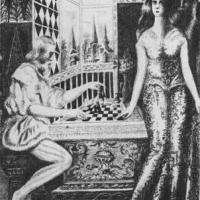
Religion and Chess
Chess and religion did not always get along. At one time or another, chess was forbidden by Muslims, Roman Catholics, Anglicans, Jews, the Puritans, and the Taliban.
Chess (shatranj) was a legal issue after Mohammad died in 642. In 655, his son in law disapproved of the game for his sect of Muslims because of the graven images (carved figures of the chess pieces).
In 680, the 50th rule of canons was interpreted as forbidding chess.
In 780, the caliph al-Mahdi wrote to Mecca religious leaders to give up chess played with dice.
In 1005, chess was banned in Egypt and all the chess sets and pieces were ordered to be burned.
In 1061, Cardinal Damiani (1007-1072) of Ostin forbade the clergy to play chess. He even wrote to the Pope complaining that chess was being played by some clergy and lay people.
In 1093, chess was condemned and forbiden by the Eastern Orthodox Church.
In 1125, the Eastern Orthodox monk John Zonares issued a directive banning chess as a kind of debauchery.
In 1128, St. Bernard of Clairvaux (1090-1153) forbate the Knights Templars from playing chess.
In 1195, rabbi Maimonides (1155-1204) included chess among the forbidden games.
In 1208, the Bishop of Paris decreed that chess be banned from the clergy.
In 1240, the Worcester Synod of England forbade chess to the clergy and the monastic orders.
In 1254, King Louis IX issued an religious edict forbidding chess as a useless and boring game.
In 1260, King Henry III instructed the clergy to leave chess alone.
Around 1280, chess moralities were written which began as sermons. These chess moralities rivalled the Bible in popularity and number of printings.
In 1291, the Archbishop of Cantebury threatened to put the prior and canons on a diet of bread and water unless they desisted from playing chess.
Priests were forbidden to play chess up to 1299.
In 1310, chess was forbidden to the clergy in Germany in a decree from the Council of Trier.
In 1328, some Jewish leaders allowed chess to be played, but not for money or gambling.
In 1329, chess was banned by the clergy in the Synod of Wurzburg in Germany.
In 1375, King Charles V of France, under the influence of the church, prohibited chess.
By 1500, chess was a recognized pastime for Jews on the Sabbath.
In 1551, leading clerics of Russia compiled the Stoglav Collection which included the prohibition of chess.
In the 16th century, St. Teresa of Avila (1515-1582) was proclaimed patroness of chessplayers by church authorities in Spain.
In the late 16th century, clergymen in Russia associated chess with witchcraft and heresy.
The Puritans greatly dislked chess and discouraged any chess play.
In 1981, chess was forbidden in Iran by Ayatollah Khomeini. It was allowed by the Ayatollah in 1988.
Chess was forbidden by the Taliban in Afghanistan for 15 years. It was banned by Mullah Mohammad Omar.
Popes that played chess included Pope Leo XIII (Gioacchino Pecci), Pope Gregory VI, Pope Innocent III, Pope John Paul I, Pope John Paul II, and Ope Leo X.





